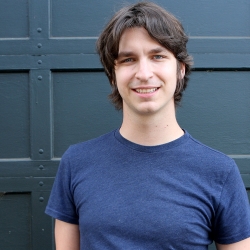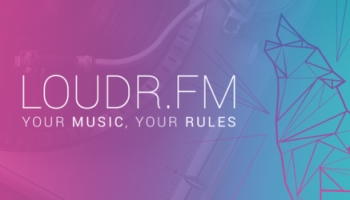Day Six: Josh Whelchel on Loudr
These days, Josh Whelchel is not only a prolific composer but also one of the masterminds behind Loudr. He's done work creating and directing charity album "Songs for the Cure" from 2009-2012, and more recently has lent his creative muscle to games like Scrolls, Castle Story, and Oblitus. Josh took some time out of his busy schedule of forging bravely ahead in the world of music to answer a few of our questions about his work and music.
RPGFan: So, introductions. Can you tell us a little bit about your background? What kind of musical training do you have? How did you become involved writing music for video games?
JW: I began writing music for "games" around 2005. They were freeware gems made in Klik & Play, The Games Factory, and what eventually evolved into Multimedia Fusion. We were a pretty tight knit community of kids that were in to making our own games - some may know Derek Yu (Spelunky, Aquaria), who created the incredible Eternal Daughter around this time (don't miss the INCREDIBLE ost - it's JRPG-inspired earporn by a talented Swede).
I was trained on classical piano for many years, but I also studied Cello and Bass throughout school. I studied composition in college at the College-Conservatory of Music in Cincinnati, OH - a pretty great experience - even though I left school to pursue music on my own agenda. I was also formally studying Computer Science at this time.
I got into VGM by diving into a community that was just making games all the time. Similar experiences today are found at TIGSource, IGDA, etc.
RPGFan: How do you approach a new project? Do you start with an idea in mind and work with that, or do you work more closely with developers?
JW: It depends - sometimes a lot of direction is given, and sometimes there is little to no input given - it's case by case. Lately, I've been erring on the taking projects that fit my creative style, which has evolved from orchestral, hyper-melodic in to a primarily Electronic Sound that's hard to describe.
Either way, close collaboration and working of drafts is necessary throughout the process - and I work closely with developers through the whole process to make sure the ultimate vision is aligned.
RPGFan: If there were no obstacles in your way, what would be your dream "collaboration" job (working with other composers or musicians)?
JW: I've been fortunate to get to work with many talented musicians (Anosou/Mattias Häggström Gerdt & HyperDuck Soundworks come to mind). I'd really love to work with Hitoshi Sakimoto someday to create a blend of his incredible writing with my more nuanced sound design. I think something really incredible could come from that.
Other than that, I just love working with the people around me who inspire me.
RPGFan: What kind of music do you listen to? What are some of your favorite artists or groups? Any favorite songs in particular, or songs that really drive you to create?
JW: Everything. Really - I'm not drawn away from most music. I've been listening to a lot of Daniel Olsen's work lately - Daniel is a great source of inspiration both as a creative mind and as a mindful human - and he communicates this excellently in his work.
And of course, I'd be lying if I didn't say the FEZ Original Soundtrack was wired directly in to my brain in some fashion.
RPGFan: What's the most rewarding part of what you do?
JW: I love creating memories for listeners, players, and 'experiencers' of any art that I can be a part of. Lately, though, I've been hard at work with Loudr - and the most rewarding part of that job is making other creators happy. I love being able to deliver a product that enables other creatives to succeed in places where doors were previously closed.
Musically, I'm working on the soundtracks for Castle Story and Scrolls with Mattias (expecting a lot of new music this year), and separately the soundtrack for Oblitus with Connor Ullman.RPGFan: Can you give a brief overview of Loudr, for those who aren't familiar with it? How does it compare to platforms like Bandcamp?
JW: Loudr is an open platform designed to give musicians the tools they need to put their music in the world - all while being transparent and friendly along the way. We are responsible for putting music on Spotify, iTunes, and others, while providing tools for artists to split their revenue (accounting), license cover songs with no up-front fees.
Loudr is the only platform where you can sell cover songs (video game arrangements, anyone?) for no up-front fees, as we directly report to publishers and composers as music sells. This allows artists and projects like Smooth McGroove, Blake Robinson, and Pokemon Reorchestrated to exist.
Loudr and Bandcamp are similar in that musicians can provide a direct-to-fan experience - this year we're adding more powerful tools for artists to engage their fans, understand what drives their fans to listen and support, and ultimately connect with their audience in a ways that haven't been available in the past.
RPGFan: Can you talk a little bit about the genesis of Loudr? Who all is involved, where the idea sprang from, that sort of thing?
JW: The history is pretty interesting - not long after the third successful Game Music Bundle, I decided to take the 'bundle platform' and open it to the public so that any group of creators could benefit from creating bundles like we did in 2011. This effort spawned Bundle Dragon.
Meanwhile, the team at Joypad Records was doing licensing for arrange albums in a small office in San Francisco. After meeting the team, it was clear that our visions were aligned.
Combined, the Joypad Records team and I formally joined, creating a company of behemoth talent and passion; we're currently 8 strong with a core team of musicians who desperately want to change the air in the music industry. The idea for Loudr spawned from this frustration - we are building a platform where artists can finally be in control of the music industry, and ultimately, in control of their brand.
RPGFan: At least in my eyes, Loudr seems like it's on the forefront of helping musicians who love game music get their covers and arrangements out there. How do you all help with that process?
 JW: Primarily, we allow content creators to monetize cover songs by working directly with publishers to secure licenses. Because we handle all of the accounting, publishers trust us with the task of making sure they are paid for every sale (removing the need for upfront payment), and we remove the burden of royalty calculations from the artist.
Moving forward, we are finding ways for artists to be able to put out these covers for free as well, without having to fear takedown notices or other fears. (It is technically illegal to put cover songs online, even for free, though it hasn't stopped many people; nor do I believe it should. Publishers don't seem to be burdened enough - yet - to pursue an effort in removing these covers.)
The bottom line is that we want to give artists the ability to do whatever they want in a legal manner - and as we continue to grow we will keep building new tools and create more opportunities).
JW: Primarily, we allow content creators to monetize cover songs by working directly with publishers to secure licenses. Because we handle all of the accounting, publishers trust us with the task of making sure they are paid for every sale (removing the need for upfront payment), and we remove the burden of royalty calculations from the artist.
Moving forward, we are finding ways for artists to be able to put out these covers for free as well, without having to fear takedown notices or other fears. (It is technically illegal to put cover songs online, even for free, though it hasn't stopped many people; nor do I believe it should. Publishers don't seem to be burdened enough - yet - to pursue an effort in removing these covers.)
The bottom line is that we want to give artists the ability to do whatever they want in a legal manner - and as we continue to grow we will keep building new tools and create more opportunities).
RPGFan: It seems like reaching out to artists is a big part of what Loudr does. How are you all working to further that goal?
JW: Working directly with artists is probably the bread and butter of what we do - being musicians ourselves, we have the distinct advantage of knowing what musicians are looking for in a platform like Loudr.
Our artist outreach team has been working hard to accommodate artists from extremely varied backgrounds. Besides the cover song atists, we're also working with VGM heroes like Grant Kirkhope and Disasterpeace - and even beyond that we have a huge audience of YouTube artists. YouTube starlets like FamilyJules, Taylor Davis, and Erutan rely on Loudr as well. (I've kept these mentions to artists in the VGM world).
RPGFan: Thanks in part to the work you all are doing, arrangements of well-beloved game tunes are proliferating at a blinding speed-- it's really expanding the world of game music and appreciation for it. Do you have any thoughts on that?
JW: My childhood was fraught with experiences like the following: I played legos, had Myst on a computer in the background (just so I could hear the music), and would let my imagination run wild. I learnt to play piano because of soundtracks to The 7th Guest, Jazz Jackrabbit, Doom...
My primary thought is that it is an incredible honor to be able to work with these musicians.
RPGFan: The state of the game music industry has changed so much. Fan arrangements, remixes, live shows and orchestral concerts are all becoming more and more common, and it seems as though more people than ever are appreciating the value of game music thanks to so many talented people. Do you have any thoughts on this, as a part of that force?
JW: The community is in an incredible place - I think it's finally becoming the world that so many of us had dreamt of as children; creating new music from the memories that inspired us is now easier than ever. The fact that we can enable people to build careers around those memories is just amazing, and I'm very proud to be a part of a team that's making that possible.
RPGFan: What's in the future for Loudr?
JW: Right now, my primary focus is on building out our new artist dashboard. We are building a tool which has the power to change the atmosphere for musicians. No charging for "pro" stats - higher quality previews thanks to new codec technology (OPUS, anyone?) - free cover song licensing - revenue splits to enable new forms of collaboration - net-label management tools - these are all pieces of what's coming up.
In addition to all of that, we'll be building out Loudr for the consumer as well: higher quality previews, more browse-ability, and so much more that I'll save for shock-value.
Thank you for taking the time to talk with me - we're really looking to what's coming up and it's always a pleasure to speak about it.
You can track Josh down via the social networking platform of your choice-- Facebook or Twitter. If you want to hear what he's been working on lately, head on over to his SoundCloud page or check out his very own profile on Loudr.